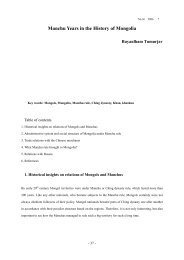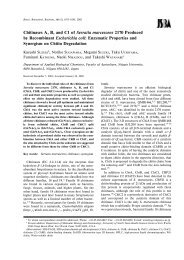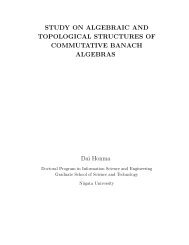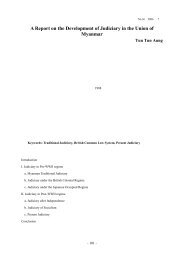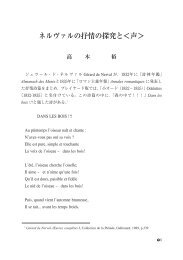An Overview of the Albanian History:
An Overview of the Albanian History:
An Overview of the Albanian History:
Create successful ePaper yourself
Turn your PDF publications into a flip-book with our unique Google optimized e-Paper software.
No.34 2005 12 <br />
In nor<strong>the</strong>rn Albania, <strong>the</strong> government directly controlled only Shkodra and its environs. The highland clans<br />
were suspicious <strong>of</strong> a constitutional government legislating in <strong>the</strong> interests <strong>of</strong> <strong>the</strong> country as a whole, and <strong>the</strong><br />
Roman Catholic Church became <strong>the</strong> principal link between Tirana and <strong>the</strong> tribesmen. In many instances,<br />
administrative communications were addressed to priests for circulation among <strong>the</strong>ir parishioners 23 .<br />
By June 1934, Albania had signed trade agreements with Yugoslavia and Greece, and Mussolini had<br />
suspended all payments to Tirana. <strong>An</strong> Italian attempt to intimidate <strong>the</strong> <strong>Albanian</strong>s by sending a fleet <strong>of</strong><br />
warships to Albania failed because <strong>the</strong> <strong>Albanian</strong>s only allowed <strong>the</strong> forces to land unarmed. Mussolini <strong>the</strong>n<br />
attempted to buy <strong>of</strong>f <strong>the</strong> <strong>Albanian</strong>s. In 1935 he presented <strong>the</strong> <strong>Albanian</strong> government 3 million gold francs as a<br />
gift.<br />
Through all <strong>the</strong> turmoil <strong>of</strong> <strong>the</strong> interwar years, Albania remained Europe's most economically backward<br />
nation. Peasant farmers accounted for <strong>the</strong> vast majority <strong>of</strong> <strong>the</strong> <strong>Albanian</strong> population. Albania had practically<br />
had no industry, and <strong>the</strong> country's potential for hydroelectric power was virtually untapped. Oil represented<br />
<strong>the</strong> country's main extractable resource. A pipeline between <strong>the</strong> Kucova oil field and Vlora’s port expedited<br />
shipments <strong>of</strong> crude petroleum to Italy's refineries after <strong>the</strong> Italians took over <strong>the</strong> oil-drilling concessions <strong>of</strong> all<br />
o<strong>the</strong>r foreign companies in 1939. Albania also possessed bitumen, lignite, iron, chromites, copper, bauxite,<br />
manganese, and some gold. Shkodra had a cement factory; Korca, a brewery; and Durres and Shkodra,<br />
cigarette factories that used locally grown tobacco.<br />
During much <strong>of</strong> <strong>the</strong> interwar period, Italians held most <strong>of</strong> <strong>the</strong> technical jobs in <strong>the</strong> <strong>Albanian</strong> economy.<br />
Albania's main exports were petroleum, animal skins, cheese, livestock, and eggs and prime imports were<br />
grain and o<strong>the</strong>r foodstuffs, metal products, and machinery. In 1939 <strong>the</strong> value <strong>of</strong> Albania's imports outstripped<br />
that <strong>of</strong> its exports by about four times. About 70 percent <strong>of</strong> Albania’s exports went to Italy. Italian factories<br />
furnished about 40 percent <strong>of</strong> Albania's imports, and <strong>the</strong> Italian government paid for <strong>the</strong> rest.<br />
Poor and remote, Albania remained decades behind <strong>the</strong> o<strong>the</strong>r Balkan countries in educational and social<br />
development. Illiteracy plagued almost <strong>the</strong> entire population. About 90 percent <strong>of</strong> <strong>the</strong> country's peasants<br />
practiced subsistence agriculture, using ancient methods, such as wooden plows. Much <strong>of</strong> <strong>the</strong> country's<br />
richest farmland lay under water in malaria, infested coastal marshlands. Albania lacked a banking system, a<br />
railroad, a modern port, an efficient military, a university, or a modern press. The <strong>Albanian</strong>s had Europe's<br />
highest birthrate and infant mortality rate, and life expectancy for men was about thirty-eight years. The<br />
American Red Cross opened schools and hospitals at Durrës and Tirana. One Red Cross worker founded an<br />
<strong>Albanian</strong> chapter <strong>of</strong> <strong>the</strong> Boy Scouts that all boys between twelve and eighteen years old were subsequently<br />
- 247 -



